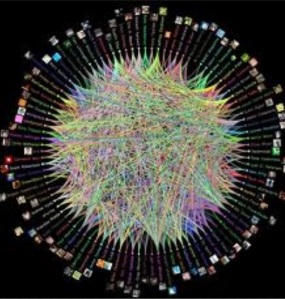The arrival of the “Internet of Things” (IoT) marks a major watershed in the global consumer economy. Internet connections will be built into a massive quantity of new products, from air conditioners to light bulbs and security alarms. These will all be controlled through apps and websites, and feed data into the cloud. Start ups specialized in home automation, established consumer electronics giants, and large Silicon Valley-based tech companies are all poised for a huge battle over this new consumer space, sometimes also referred to as the “Connected Life” market.
A report from BI Intelligence, recently examined the forces and numbers driving growth in the consumer Internet of Things or IoT, including the mind-boggling numbers for total market size. It’s difficult to overestimate the importance of the Internet of Things because it will come to encompass all manner of products we don’t normally think of as high-tech, such as UV-filtering window shades and door locks.
Here are some of the top findings:
-
Defining the Internet of Things: It’s helpful to think about IoT devices as a new device category or layer that exists as the connective tissue between the formerly static non-connected world, and the world of PCs, tablets, and smart phones. For example, a connected washer and dryer unit can report energy usage and cycle settings to a smart phone app.
-
The size of the opportunity: Machina defines “Connected Life Market Revenue” as the sum of all of the revenue accruing from the sale of connected devices and all related services. They see revenue ballooning to $2.5 trillion by 2020.
-
How can it be so large? Many consumer categories are crossing into the IoT: These include kitchen and home appliances, lighting and heating products, and insurance company-issued car monitoring devices that allow motorists to pay insurance only for the amount of driving they do.
-
Large manufacturers are already making big plays: These include LG, the Korean manufacturer of home entertainment systems and appliances and Friedrich, maker of AC units.
-
Start ups are making a grab for this market too: SmartThings has built its entire business model around easily deployable sensors, monitors, and apps that allow consumers to run everything in their home through their smartphone. It raised a $3 million seed round late last year. We also expect companies such as Apple, Google, and others to get more involved.
DO YOU REALLY NEED IT?
If you’re like me, you’ll ask the question “how does all this inter-connectivity benefit our lives? The simple answer is that for most of us, it doesn’t. But for the companies who continually vie for more data and more details on where we live and how, they stand to reap the rewards by learning details about our usage patterns that they previously had no access to. At a time when most rational people are trying to find ways to unplug and free themselves from our already insanely connected life, I personally fail to find any benefit with my refrigerator sending details about the frequency of the door opening or it’s contents to the mother ship. Sorry that’s just me. In fact, I question all the seemingly useless connections and apps that are marketed to all of us in the attempt to make us believe we cant live without it. Life was simpler 20 years ago. You could leave work and spend time with your family and build a family unit. Instead, today we are available, working and being summoned by a wide range of people and systems 24/7, which only serves to remove time from our family life.
I do use and enjoy technology. I just try to determine the features and benefits prior to using or downloading it. In fact, about once a month I will comment on some new technology that actually benefits my life, but always seem to find myself saying, I could still live without it.
Let me know your thoughts on this topic, I would enjoy hearing from you about your personal position on being connected.For those who wish to learn more visit reCALIBRATEYOURSELF.COM
